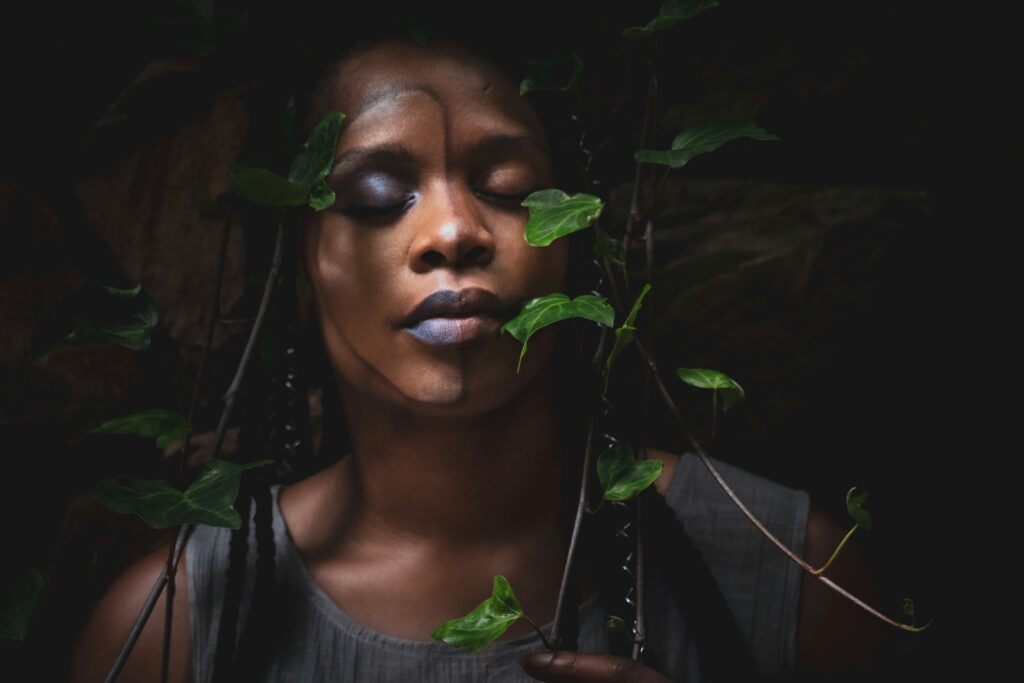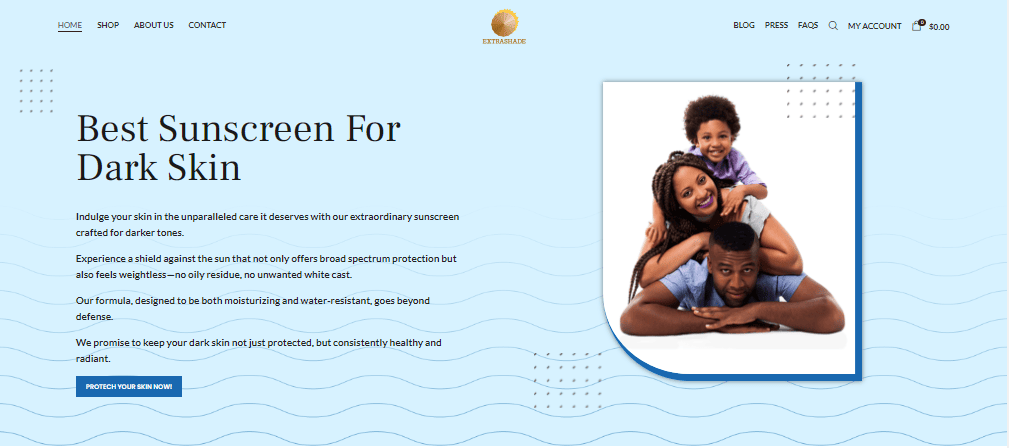We’ve all heard the saying “Black don’t crack,” but does that mean sunshine is a friend to darker skin tones? The truth is, that sun protection is crucial for everyone, regardless of race.
In today’s discussion, we’ll unveil the facts about sunscreen and black skin, exploring why black people need sunscreen. Moreover, here we will discuss how to choose the right sunscreen for dark skin.
So, without further ado, let’s dig deeper.
The Myth of Melanin’s Protection
The belief that melanin provides complete protection from the sun is a widespread misconception, often referred to as the “melanin myth.” While melanin does offer some natural protection, it’s crucial to understand its limitations and the importance of sun protection for everyone, regardless of skin tone.
Here’s why the myth of melanin’s complete protection is inaccurate:
- Limited SPF: Melanin offers a natural Sun Protection Factor (SPF) of around 13, which is significantly lower than the recommended minimum of SPF 30 for sun protection. This means that even with melanin, individuals are still susceptible to sunburn and UV damage after extended sun exposure.
- Uneven Distribution: Melanin production can vary across different areas of the body, leaving some areas more vulnerable to sun damage. For example, the lips, palms, and soles of the feet often have lower melanin content and require extra protection.
- Different UV Rays: Melanin primarily protects against UVB rays, which are responsible for sunburns. However, UVA rays, which penetrate deeper into the skin and contribute to premature aging and skin cancer, can still damage skin with melanin.
It’s important to remember that everyone, regardless of skin tone, should practice sun safety measures:
- Sunscreen: Apply broad-spectrum sunscreen with SPF 30 or higher daily, even on cloudy days. Choose a water-resistant sunscreen if you’ll be sweating or swimming.
- Clothing: Wear protective clothing, such as long-sleeved shirts, pants, and wide-brimmed hats, to cover exposed skin.
- Shade: Seek shade, especially during peak sun hours (10 am to 4 pm).
Why Sunscreen is Crucial for Black Skin
While melanin, the pigment that gives skin its color, provides some natural protection from the sun, it’s important to understand that everyone needs sunscreen, regardless of skin tone. Here’s why sunscreen is crucial for black skin:
- Melanin offers limited protection: Melanin can absorb some UV rays, but its protection is comparable to an SPF of 13, which is significantly lower than the recommended SPF 30 for daily use [Healthline article on Black people and Sunscreen].
- Risk of skin cancer: Skin cancer is less common in black people than in white people, but it can be more aggressive when it does occur. This is partly because skin cancer is often diagnosed at a later stage in black people, when it’s more difficult to treat. Early detection is key!
- Sun damage and premature aging: The sun’s ultraviolet (UV) rays can damage skin cells, leading to wrinkles, fine lines, age spots, and uneven skin tone. Sunscreen can help prevent this damage and keep your skin looking youthful.
- Hyperpigmentation: Sun exposure can worsen hyperpigmentation, which is the darkening of certain areas of skin. Sunscreen can help prevent hyperpigmentation from developing and make existing hyperpigmentation less noticeable.
Sunscreen is an essential part of a healthy skincare routine for everyone, regardless of skin tone. By wearing sunscreen every day, you can help protect your skin from the sun’s harmful rays and keep it healthy and looking its best.
Choosing the Right Sunscreen for Black Skin
People with darker skin tones often have the misconception that they don’t need sunscreen. However, melanin, the pigment that gives skin its color, provides some natural protection from the sun’s harmful ultraviolet (UV) rays, but it’s not enough. Here’s what to look for when choosing a sunscreen for black skin:
- Broad-spectrum SPF 30 or higher: Broad-spectrum SPF protects against both UVA and UVB rays. UVA rays penetrate deep into the skin and can lead to premature aging and wrinkles. UVB rays burn the skin and can increase your risk of skin cancer. An SPF of 30 blocks 97% of UVB rays, while an SPF of 50 blocks 98%.
- Mineral sunscreen: Look for sunscreens that contain zinc oxide or titanium dioxide as the active ingredients. These are mineral sunscreens that sit on top of the skin and reflect UV rays. They are less likely to irritate the skin than chemical sunscreens, which absorb UV rays.
- Sheer or oil-free formula: Sunscreens that are labeled as “sheer” or “oil-free” are less likely to leave a white cast on the skin. This can be a problem with some sunscreens, especially on darker skin tones.
- Hydrating ingredients: Look for sunscreens that contain ingredients like hyaluronic acid or glycerin, which will help to keep your skin hydrated. Black skin is more prone to dryness, so this is especially important.
Sun Protection Beyond Sunscreen
While sunscreen is a crucial element in sun protection, there are several other steps you can take to shield yourself from the sun’s harmful rays:
- Seek shade: Whenever possible, seek shade, especially during the peak sun hours of 10 am to 4 pm. This is particularly important for people with fair skin or those who burn easily.
- Wear protective clothing: Cover up with long-sleeved shirts, pants, hats with wide brims, and sunglasses that block UVA and UVB rays. Opt for tightly woven fabrics with a UPF (Ultraviolet Protection Factor) rating of 50+.
- Wear a hat: A wide-brimmed hat can help protect your face, neck, ears, and scalp from the sun’s rays.
- Stay hydrated: Drink plenty of water throughout the day to stay hydrated, as sun exposure can lead to dehydration.
- Limit sun exposure: Avoid excessive sun exposure, especially during peak sun hours. If you must be outdoors during this time, take breaks in the shade and reapply sunscreen frequently.
- Be mindful of medications: Certain medications can increase your skin’s sensitivity to the sun. Consult your doctor if you have any concerns.
Conclusion
While melanin offers some natural sun protection, Black individuals are still susceptible to the harmful effects of UV rays, including sunburn, premature aging, and even skin cancer. Choosing a broad-spectrum sunscreen with SPF 30 or higher and applying it generously and regularly is essential for maintaining healthy, beautiful skin, regardless of skin tone. So, skip the sun safety myths and embrace sun protection for a lifetime of healthy, vibrant skin.
Frequently Asked Questions (FAQs)
Why is sunscreen important for people with darker skin tones?
Melanin provides some natural UV protection, but it is not enough to prevent long-term damage. Without sunscreen, darker skin can still develop hyperpigmentation, premature aging, and increased risk of certain skin cancers.
Don’t darker skin tones naturally resist sun damage?
Darker skin absorbs more UV radiation than lighter skin, but it does not make it immune to harm. Even small amounts of UV damage can accumulate over time, leading to uneven tone and other issues.
What specific skin concerns can sun exposure cause in Black skin?
The most common issues are hyperpigmentation, dark spots, and worsening of existing conditions like melasma. These are often harder to treat without consistent UV protection.
How should Black people choose the right sunscreen?
Look for broad-spectrum protection with SPF 30 or higher, preferably in lightweight, non-greasy formulas. Mineral and chemical sunscreens designed for darker skin tones help avoid white cast.
Can sunscreen help improve existing dark spots or uneven tone?
While sunscreen itself won’t erase dark spots, it prevents them from worsening. Consistent use allows treatments like serums or retinoids to work more effectively.
Is daily sunscreen necessary even for short periods outdoors?
Yes. UV rays penetrate through windows and cloud cover, so incidental exposure adds up. Applying sunscreen daily is the best defense against long-term damage.
Are there sunscreens specifically formulated for melanin-rich skin?
Yes. Brands like EXTRASHADE and others create sunscreens that blend easily, provide strong protection, and address the unique needs of darker complexions.



